#Siege of Toulon
Explore tagged Tumblr posts
Text

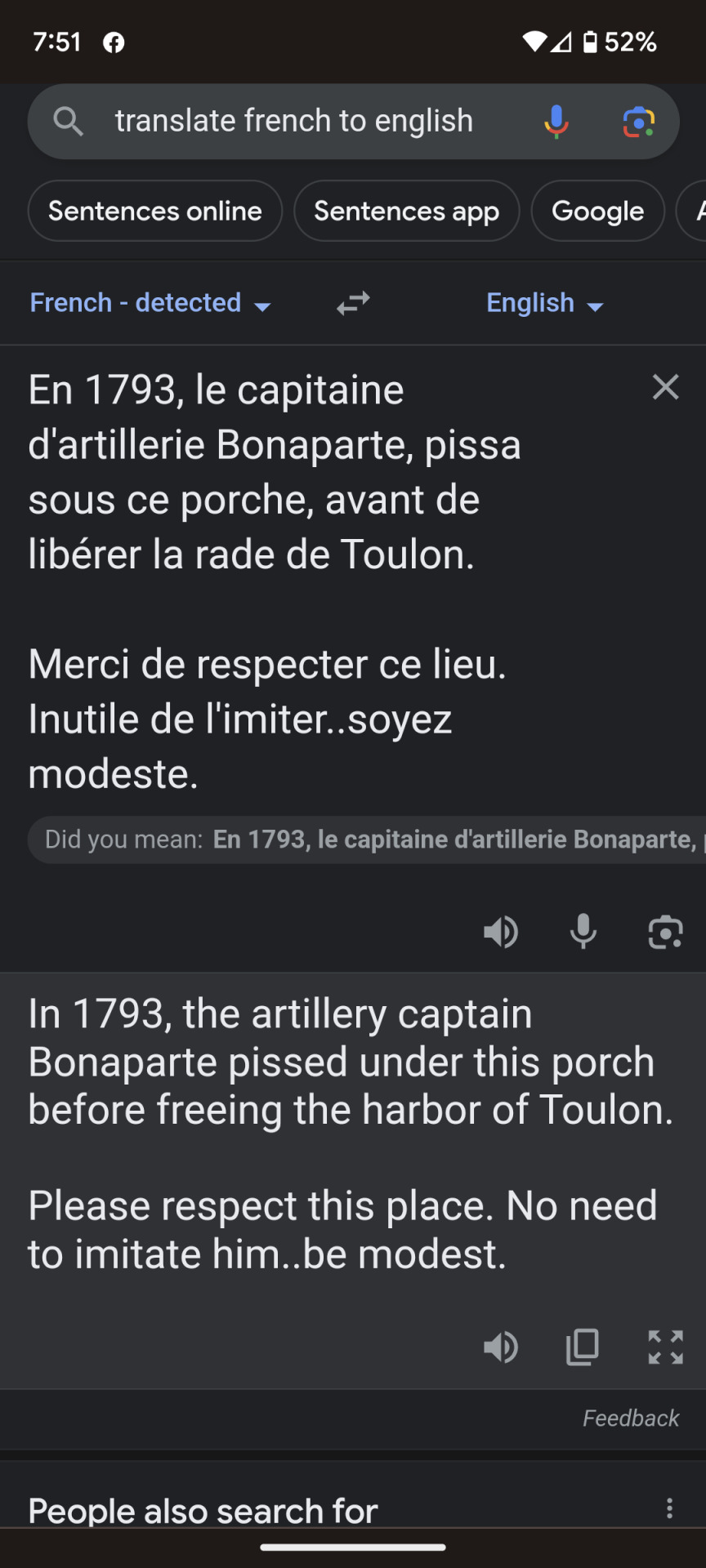
Oh...
252 notes
·
View notes
Text

Napoleon (2023)
#napoleon#joaquin phoenix#film#ridley scott#cinema#gif#gifs#napoleon bonaparte#napoléon bonaparte#napoléon#bonaparte#toulon#france#malta#europe#european#napoleonic#french revolutionary wars#siege of toulon#history
67 notes
·
View notes
Text
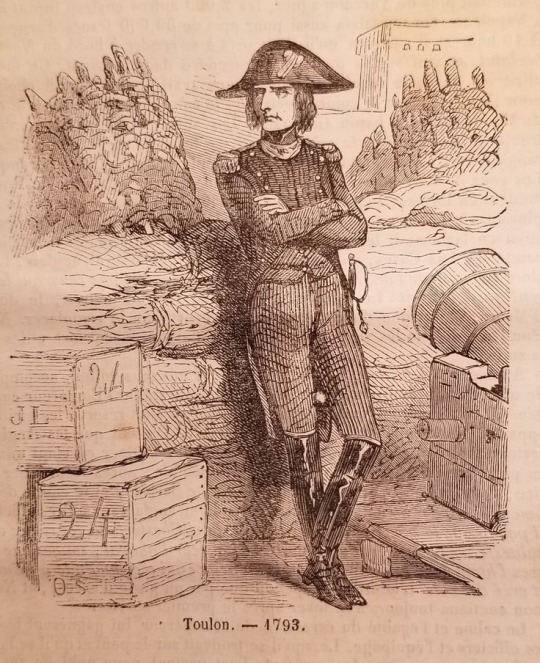
There he is
Toulon — 1793
#siege of Toulon#Toulon#France#battle of Toulan#Napoleon#napoleon bonaparte#french revolution#napoleonic#illustration#battle#art#1700s#18th century#history#historical art#drawing#military#military history#frev#napoleonic wars#historical#uniform
98 notes
·
View notes
Text
I know right? I was speechless too! She's amazing! She's also the ACTUAL owner of the nickname "Madame Sans-Gêne"💅💅💅
Apparently napoleon was neither the most interesting or weirdest person at the siege of Toulon
That honor goes to Marie-Thérèse Figueur

There was just straight up a woman fighting there. And not even “oh she disguised herself as a man mulan-style” just … an out and about woman
I just learned about her today and how did I not hear about her before
147 notes
·
View notes
Text
Napoleon - Movie Review
Disclaimers: 1. Quotes by Napoleon are not from the movie. 2. The movie has been criticized for possible historical inaccuracies and I have not corroborated historical details. Power is my mistress. I have worked too hard at her conquest to allow anyone to take her away from me. – Napoleon Bonaparte In the movie “Napoleon”, writer David Scrapa and director Ridley Scott tell the story of…
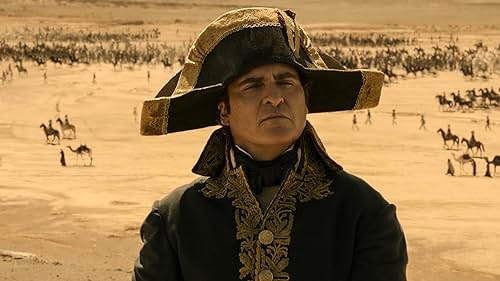
View On WordPress
#David Scarpa#French Revolution#Joaqin Phoenix#Napolean Bonaparte#Ridley Scott#Siege of Toulon#Vanessa Kirby
0 notes
Text
Research for Historical Fiction
Researching for historical fiction can seem like a daunting prospect. It’s hard to know where to begin when you want to write in detail about a specific event. Here’s how I do my research, im case anyone else finds it useful.
Initial Steps
My first port of call is usually Wikipedia, despite the fact it can be rather inaccurate at times. It’s very useful for getting an over-arching idea of what you are researching, as well as any places where you want to know more. For example, I was recently researching the Siege of Toulon in 1794, and the Wikipedia article highlighted the fact I needed to know more about where the French forts were positioned, and get a better idea of the tactics.
Next I head over to YouTube and this lovely hellsite. YouTube often has useful explanatory videos, and I find having visual maps explained to me much more useful that reading text on the same subject. As for here, there are many lovely people specialising in historical eras, and it’s not hard to find them and ask questions.
Digging Deeper
Once I have a rough idea of the thing in researching, I spend some time looking for specific details I want to incorporate.
I Always love using books, and I’m lucky enough to have several on most of the subjects I’m interested in. For the Toulon research, I looked through my biographies of Napoleon, to see what they had to offer on N’s reactions to the incompetency of the generals, positioning of forts etc. This also gave me the names of some of the more useful forts, and notes about Larrey, who I wanted to add into the story as a long term character.
Then, I started scouring the internet, using both the English and the French versions (although I’m awful at reading French), as I wanted to find out how many cannon were stationed at each fort, and where on earth French headquarters were. This took ages, and was very frustrating, but I did eventually find the things I was looking for.
Remembering all the Facts
Doing research is of little use if you forget what you’ve learnt, so I find taking notes as I go along is invaluable. I prefer to use pen and paper, but digital notes, or voice messages, work just as well, so long as you have the facts stored somewhere useful.
Remember! Not all your research needs to go into your story. I always leave facts out, because they just don’t fit into the arc of a chapter, or it doesn’t seem necessary to the plot. The point of research is to build up a believable world for the characters to live in, not to repeat history word for word.
I hope this helps, and happy writing!
#writeblr#creative writing#historical fiction#research#the Siege of Toulon#MR#A Monsterous Regiment of Women#writing advice
2 notes
·
View notes
Text
"Back to another time" historical fanfic
a question to all napoleonic fans out there:
What should be changed or improved if a time travel were to travel back into the Napoleonic era?
So it's no secret of mine that I've been planning of writing a historical fanfic of a surgeon leonard dunard who's a pretty big napoleonic era nerd travels back in time during 1794 the siege of toulon. I've been kind struggling piecing this story together because of the not so many sources that I can go off
I just have alot of questions and not so many answers.
Now of course I'm not really thinking about giving napoleon the biggest W of all time there are going to be struggles but I think we can all agree that the peninsular wars and the attack to Russia can be avoided.
But I'm not only thinking of the way of how napoleon could've won but I was also think of how our modern surgeon Leonard could improve the medical field more.
I know that our boy larrey is definitely going to be involved since he was in most of the campaigns.
So I will just write down my questions under here and hope that some of yall can answer it I'll even organize it from which battle/chapter it would be used for you can ask me to explain further if some of it doesn't make sense.
Siege of toulon:
-how would a young surgeon inlist themselves into the medical field of the army?
-what was expected from a chirurgien sous aide major?
-what were the major issues the in the 18th century medical field? And how can they be fixed?
- how could dunard(oc) meet larrey? (So in what way could they have met eachother and stay in contact without napoleon introducing them to eachother)
Italian campaign 1796-1797:
-was is it common practice for surgeons to be in the midst of an active battle rescuing patients ?
-could a surgeon be given command to a battalion if it was needed?
-were nurses a thing in that time? And if not how could dunard incorporate them in the medical field?
-why wasn't there symbol for the medics to indicate that they're medical staff?
Egyptian campaign:
-how did the French army handle the spreading of the plague and could it be more improved?
-if the French fleet would have won at the battle of the nile against the British fleet would the British do more to sabotage the French army? Or would they just give up?
-> and would the Egyptian campaign only have taken 1 year to finish? Instead of 3 years
Italian campaign 1800
- what if desiax lived would he and davout been a unstoppable duo?
-if messena got navy support would he have continued fighting?
-should napoleon not have split his army that much in the battle of marengo?
Napoleons reign 1804-1812
-would it have been better if napoleon didn't become emperor?
-is it possible for a surgeon to become a marshal?
-could alot of the coalitions have been avoided if napoleon took the right steps?
Now I'm asking these questions because I struggle to find answers to these questions and I genuinely want to discuss more about my history fanfic so that I can maybe make fun fic to read that doesn't completely go of the rails i do kind what to keep it "realistic" if you know what i mean. so if your interested in it as I am I would love to talk about it more ^^

63 notes
·
View notes
Text
Little Yellow Emperor: the Life of Napoleon in LEGO
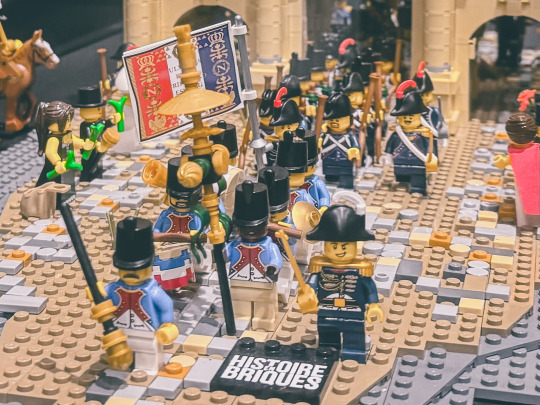
The Battle of Waterloo Domain is hosting a LEGO exhibit called "THE LEGEND OF NAPOLEON IN LEGO BRICKS." As a recovering LEGO addict and an eternal fan of 18th/19th-century French history, I simply had to go. After successfully bribing the husband with beer and fries and the children with waffles, we made the trip today.
The exhibition was smaller than I expected, but some of the builds were genuinely impressive. It traces Napoleon's life from his birth in Corsica to his death on Saint Helena—a neat, bite-sized way to introduce his story, and a fun way of recreating history. However, one thing that did bug me a bit: while the audio guide is available in multiple languages, all the wall texts are in French. In a trilingual country, especially at such a touristy site, that feels like a bit of a miss (plus, it gave the Dutch-speaking husband an excuse to grumble).
Gripes aside (1), the exhibit was a lot of fun. Here are my favourite builds.
1. The Campaign in Egypt

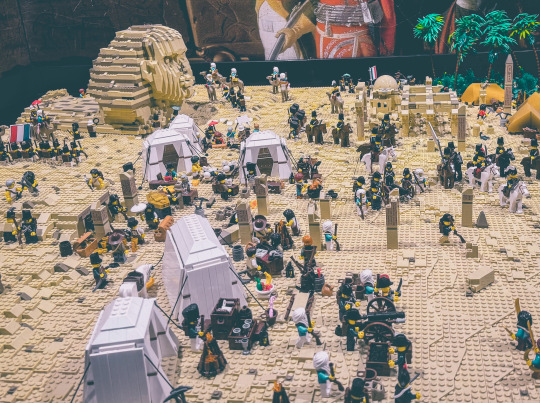
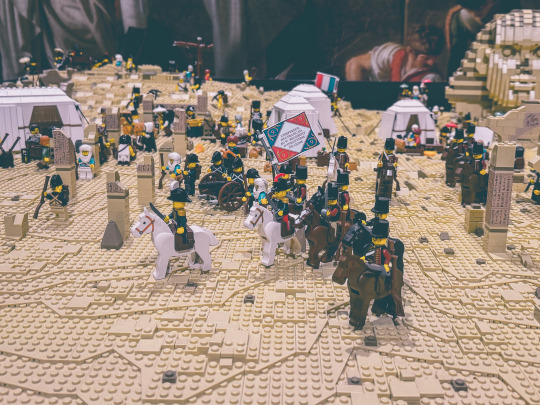
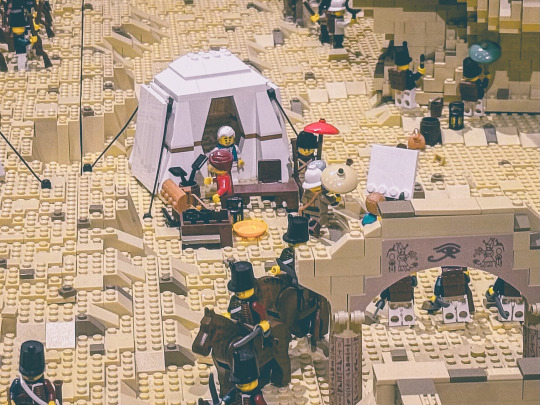
This recreation of Napoleon’s Egyptian campaign is absolutely brilliant. The photos don’t do it justice—every detail, from the Sphinx to the busy French camp, is spot on. It's also huge and apparently took close to 70 hours to build! @chickenmadam can you spot Kléber?
2. Napoleon's Coronation as Emperor
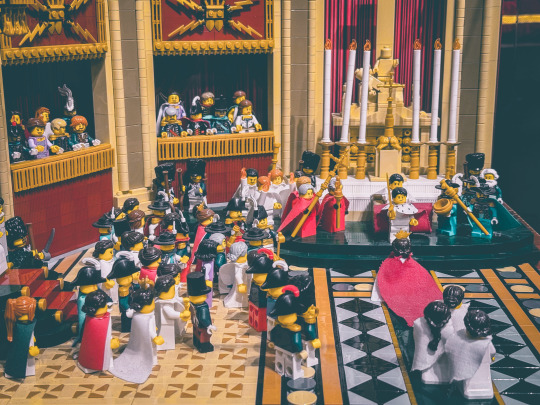
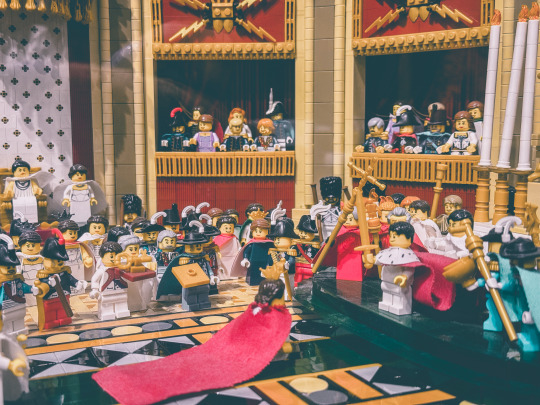
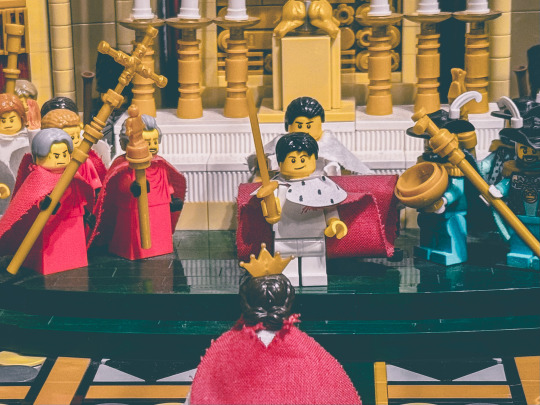
The second build, depicting Napoleon's coronation, may be smaller, but it's full of impressive details. I especially loved the grumpy expression on Pope Pius VII’s face, along with the equally unimpressed looks from the rest of the clergy—it really adds character to the scene!
3. The Coup on 18th Brumaire
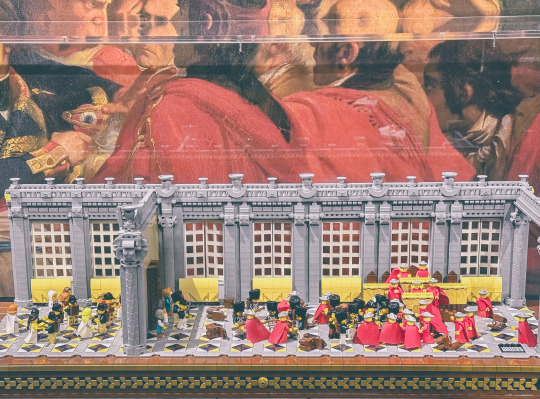
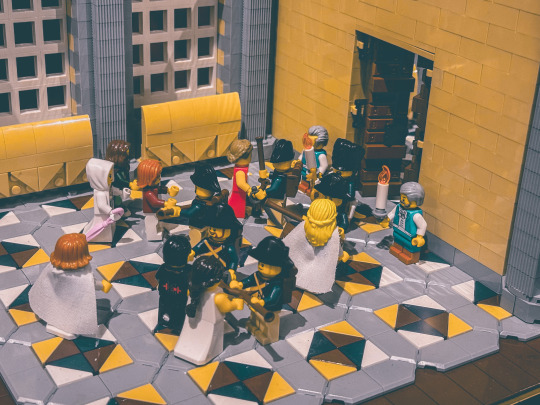
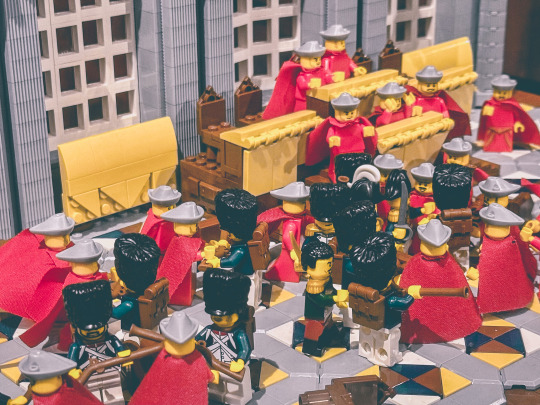
Again not a very big build but... those red capes... the hats... the outfits —need I say more?
4. Napoleon asks Josephine for a Divorce
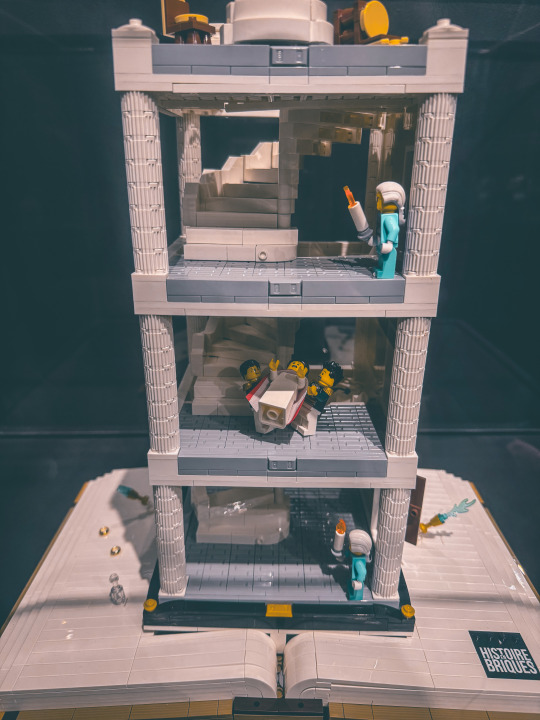
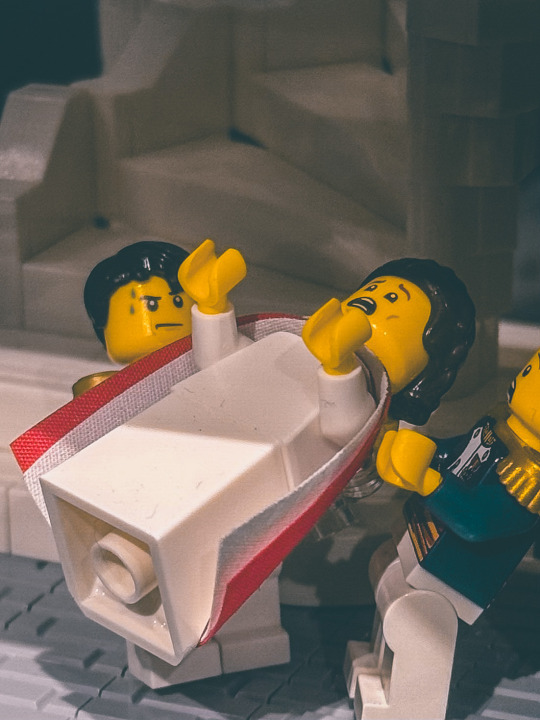
This moment is supposed to be, by all accounts, heart-wrenching for everyone involved—Napoleon asking Josephine for a divorce. But, since it’s LEGO, it ends up looking unintentionally hilarious.
5. The Crossing of the Berezina River
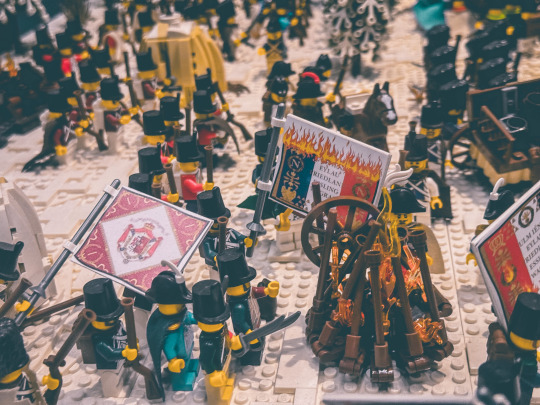
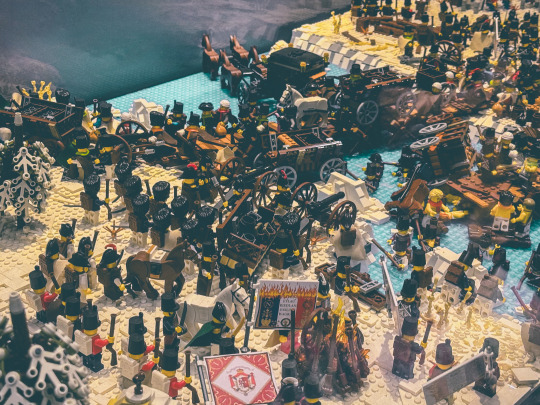
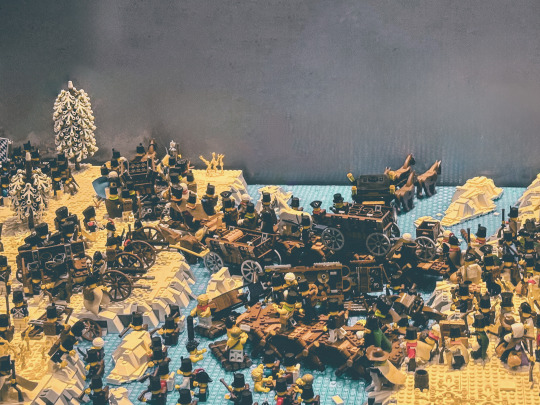
This is another brilliant build, capturing what was arguably Napoleon's greatest military disaster. While it's not as large as the Egypt campaign scene, it’s packed with intricate details that make it just as interesting.
6. Napoleon's Civil Code
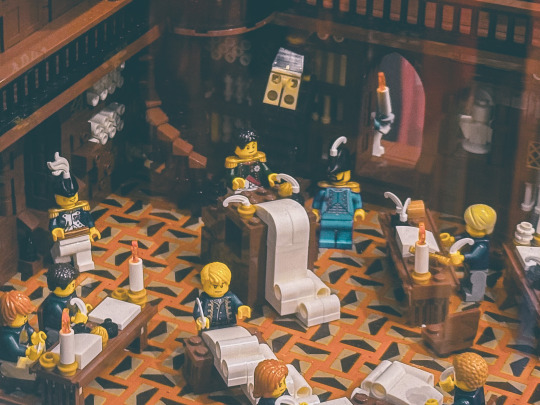
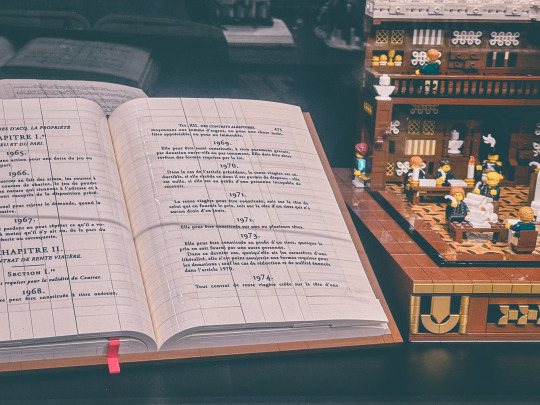
Yes. He has a GIANT parchment.
7. Daddy Napoleon and his son
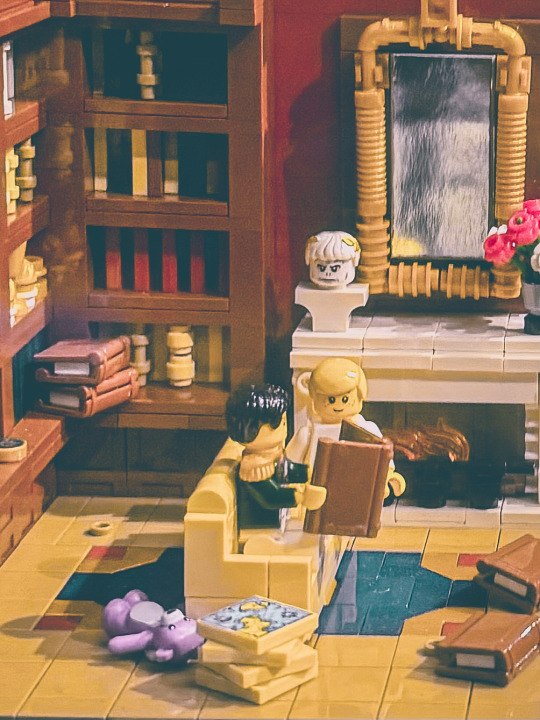
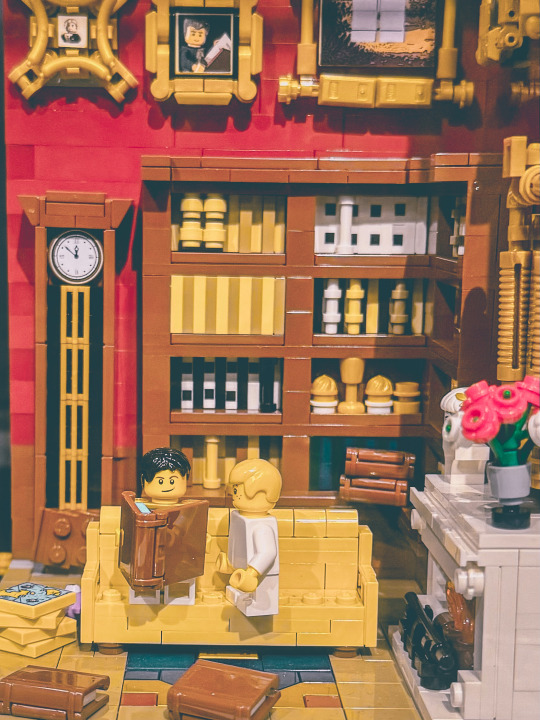
Because the King of Rome has a purple teddybear and a grumpy statue of his dad in his room...
Bonus: The Battle of the Arcole Bridge
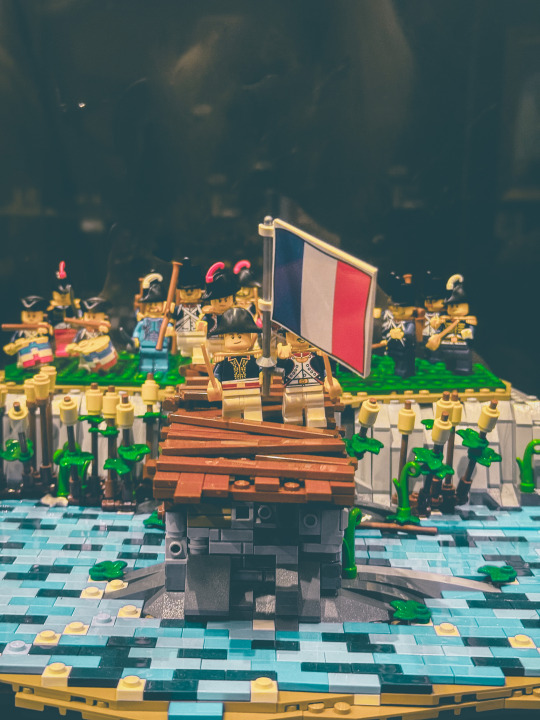
Not particularly impressive per see as a build, but this is one of my favourite moments in Napoleon's story, so... why not?
Notes
(1) Yes, they recreated the siege of Toulon. No, Bonbon isn't in it. That makes me sad.
#frev#napoleonic era#napoleon bonaparte#napoleon#history#lego#napoleon ii#french revolution#amateurvoltaire’s travel diary
81 notes
·
View notes
Photo

Napoleon Bonaparte During the Early French Revolution (1789-1794)
Of all the careers that soared to meteoric heights during the chaotic decade of the French Revolution (1789-1799), none was more spectacular nor impactful than that of Napoleon Bonaparte (1769-1821). From an unremarkable birth into minor Corsican nobility, Napoleon would find in the Revolution a path to fame, military success, and ultimately, to his role as Emperor of the French.
A quick glance at his career would be enough to show how intertwined his fate would become with the Revolution. His promising performance at the Siege of Toulon in 1793 would lead to his brilliant command of the Army of Italy, which in turn would help provide him with enough popularity and influence to seize control of the government in the Coup of 18 Brumaire, the event which many scholars consider to be the end of the Revolution. To understand this version of Napoleon, it is necessary to look at the person he was at the start of the Revolution; hardly the picture of a dashing military commander or French patriot, the Napoleon of 1789 was a thin, awkward man who did not yet even consider himself French.
Indeed, in 1789, 20-year-old Napoleon was in something of an identity crisis, looking to reconcile his ambitions of literary fame with his education as a soldier, his devotion to French revolutionary ideals with his Corsican nationalism. The early Revolution was undoubtedly a time of personal development for the young artillery lieutenant, the outcome of which would not only affect his own future but also the fate of all of Europe.
The Corsican
In 1768, the year before Napoleon's birth, the Kingdom of France purchased Corsica from the Republic of Genoa, which had distantly ruled it for the previous few centuries. Although nominally under Genoese control, the Corsicans had been used to effectively ruling themselves. They had recently claimed independence, declaring the Corsican Republic in 1755, but such aspirations to self-rule would come to an end with the arrival of the French. In Napoleon's own words, he was born "as the fatherland was dying. Thirty thousand Frenchmen, vomited upon our coasts, drowning the seat of liberty in torrents of blood" (Bell, 18).
There was resistance, of course. Led by Pasquale Paoli (1725-1807), the Corsicans were initially successful at beating back the French Expeditionary Force that landed on their shores in 1768. However, this success would not last, as the French had the advantage in manpower and supplies; the French victory at the Battle of Ponte Novu in 1769 destroyed the Corsican will to fight. Although sporadic guerilla warfare continued, Paoli fled to Britain, and Corsica was annexed by France.
Although this defeat was lamented by many Corsicans, some were able to take advantage of this regime change. Napoleon's father, Carlo Buonaparte, was one of them. A former ally of Paoli, Carlo chose to abandon the patriotic cause to ensure a future for his family. His gamble paid off, as Carlo's devotion to the new government allowed him to secure minor nobility status for his family under French law, which in turn allowed him to send his oldest sons to receive education in French royal academies. Because of his father's change in loyalties, ten-year-old Napoleon was educated at the military academy of Brienne in northern France, where he learned French and excelled in mathematics. Paoli, however, would not forget nor forgive Carlo's apparent betrayal.
Despite reaping the benefits of French occupation, teenaged Napoleon remained a staunch Corsican nationalist. He idolized the exiled Paoli as a freedom fighter and clung to dreams of an independent Corsica. Such a demeanor, along with his strange accent and difficult-to-pronounce name (recorded in the school registry as Neapoleonne Buonaparte), quickly alienated Napoleon from his French classmates. Much of his time was spent alone, and he would soon develop a “thoughtful and gloomy” nature, according to his headmaster (Roberts, 11). Lacking companions, Napoleon would find company amongst his books. He adored poetry and history, although he also took an interest in the Enlightenment philosophers, who were so popular at the time. He became especially fond of Jean-Jacques Rousseau, perhaps because of Rousseau's own support of the Corsican plight. Napoleon adopted many of Rousseau's ideas, which would soon become the same ideas that fueled the Revolution.
In 1786, the year after he graduated from the prestigious Ecole Militaire as an artillery lieutenant, 16-year-old Napoleon embarked on something of a literary career. An exceptionally ambitious young man, it did not seem likely that he, as a Corsican-born man of minor nobility, would amount to much in the French army. To compensate, Napoleon sought literary glory instead. Over the next ten years, he would write over 60 essays, novellas, and letters. His first known essay, written on 26 April 1786, argued that Corsica had an undeniable right to resist the French, while a follow-up essay entitled On Suicide was an interesting mixture of nationalistic pride and teenaged angst:
My fellow countrymen are weighed down with chains, while they kiss with fear the hand that oppresses them…you Frenchmen, not content with having robbed us of everything we hold dear, have also corrupted our character. A good patriot ought to die when his fatherland has ceased to exist. (Roberts, 22)
Although borderline treasonous, especially for an enlisted officer in the French army, Napoleon continued espousing his nationalism in his writings over the next few years. He spent months, on and off, writing a comprehensive history of Corsica, in which he compared his countrymen to the virtuous ancient Romans, while also penning a novella entitled New Corsica, which was, in the words of biographer Andrew Roberts, little better than a graphic "Francophobic revenge fantasy" (Roberts, 31). He would find little publication luck, and for a time, it appeared the young artillery lieutenant may be doomed to literary as well as military obscurity.
Then, in 1789, the course of history shifted. The Estates-General of 1789 declared themselves a National Assembly, wresting authority from the king. In July, the commoners took matters into their own hands with the Storming of the Bastille. The French Revolution had begun.
Continue reading...
28 notes
·
View notes
Text

Saw this on Pinterest
The Siege of Toulon 1993
12 notes
·
View notes
Text

Napoleon at Toulon (The Siege of Toulon) 1793
by Jacques Onfroy de Bréville
#napoléon bonaparte#napoleon bonaparte#toulon#siege of toulon#art#napoleonic#french revolutionary wars#history#france#french#europe#european#siege#jacques onfroy de bréville#job#illustration#napoleon#bonaparte#napoléon#mediterranean#cannon#cannons#artillery#cannonball#cannonballs
111 notes
·
View notes
Text
At the siege of Toulon in 1793, Napoleon (who was then 24 years old) was trying to order the soldiers to move forward, but the battery was in a very exposed position and many thought it was a suicidal order. How did Napoleon deal with this situation? He renamed the battery to “Batterie des hommes sans peur” or Battery of the men without fear. Turns out men will risk anything to not be seen as cowards because they all volunteered to take the battery after that.

#and then Napoleon got stabbed#but at least he didn’t have fear lol#long haired Napoleon tales and adventures#siege of Toulon#Napoleon#napoleonic#Toulon#napoleon bonaparte#french revolution#frev#napoleonic era#first french empire#french empire#france#job#job the illustrator
25 notes
·
View notes
Text
Thinking rn of when Elizabeth Taylor, at 37, wanted to play anne boleyn in Anne of the thousands days and was told she was “too long in the tooth” and this was like, nodded and agreed with even by feminist scholar Susan bordo in creation of Anne boleyn
And then I had to go see Napoleon and see a geriatric Joaquim Phoenix limp across the siege of Toulon. A near 50 year old man playing a 23 year old, even as he flirts with a woman who is meant to be 6 years his senior but is actually precisely the age Josephine should be, in her 30s, in contrast to his, again, late 40s.
And it’s like hm.
Hmm.
Hmmmmmmm.
You can play Young Napoleon at 23 when you’re 50
But you can’t play Anne Boleyn, who may have died when she was about 32, at 37. I wonder why. Hmm. I wonder. I wonder,, I wonder why that is, hmmmmmm
409 notes
·
View notes
Text
On St. Helena, Napoleon remembers Colonel Muiron
I had more trouble about one of my aides-de-camp, killed at Arcole, the brave Colonel Muiron. He had served, since the first days of the revolution, in the artillery corps. He had particularly distinguished himself at the siege of Toulon, where he had been wounded while entering through an embrasure into a famous English redoubt.
His father was arrested as a tax farmer. [Muiron] came to present himself at the National Convention, at the revolutionary committee of his section, covered in the blood he had just shed for the fatherland; he succeeded: his father was set free.
On the 15th Vendémiaire he commanded one of the artillery divisions that defended the Convention; he was deaf to the seductions of a large number of his acquaintances. I asked him if the government could count on him. — Yes, he told me, I have sworn to support the republic, I will obey my leaders; I am also an enemy of all revolutionaries. He behaved effectively as a brave man, and was very useful in this action which saved freedom.
I took him as an aide-de-camp at the beginning of the Italian campaign; he rendered essential services in all matters; finally he died gloriously on the battlefield at Arcola, leaving a young widow who was eight months pregnant.
I asked, in consideration of the services he had rendered, that his mother-in-law be removed from the list of emigrants on which she had been registered, although she had never left France. I demanded the same justice for his brother-in-law, a young man who was fourteen years old when he was registered on the fatal list; he had been in a foreign country for his education.
[There was a frigate named after Muiron that took Bonaparte from Egypt to France.]
Mémorial de Sainte-Hélène. Suivi de Napoléon dans l'exil ; [Derniers moments de Napoléon]. Et de L'historique de la translation des restes mortels de l'empereur Napoléon aux Invalides. T. 2 / par le comte de Las Cases ; par MM. O'Méara et Antomarchi ; [publié par F. Payot]
bnF Gallica
#Napoleon's ADCs#did not know Muiron had a pregnant wife#Napoleon's good deeds#St. Helena#don't know what the trouble was
26 notes
·
View notes
Note
Don't tell my friend that I did not sleep immediately (she will scold me XD). But what is Napoleon and Junot about? Gib their interactions, their history, the tension, their secrets, what you thought about them, what is good and bad about them, headcanons, some things that you love about them, anything that will save my curiosity before I go to sleep in 4:30 am 👀
That is all. Have a nice day/evening 😌
HELLO!! sorry for my late reply I have the cold and I was figuring how to write this without sounding too crazy 😭😭 thank you @whatever-whatsoever for reminding me to check my inbox 🤩 YESSS NAPJUNO ASK!!!! THANK YOU ❤️❤️ I'll have to give a super abbreviated version because they had so much history *sniff* 🥺
I may yap more about my personal head canons and why I love them in a separate post hehehe👅
disclaimer: I don't claim to be objective or an historian as this is very napjuno-biased :P English is not my first language so there will be many grammatical mistakes😭
I feel like I should first mention that Napoleon and Junot had a long history of correspondence throughout their lifetime. And Junot kept every. single. letter Napoleon wrote to him. Unfortunately none of these letters exist anymore because Napoleon sent a lackey to have them burned the moment Junot committed suicide. (I WILL NEVER FORGIVE NAPS FOR THIS 😭) so most of what we know about their relationship is secondhand from Junot's wife, Laure Junot's (Duchesse d'Abrantes) memoirs. She's also not the most reliable person so it's possible she might heavily exaggerated on some stuff
As for the letters, it's always been up for debate why Napoleon wanted them gone but my personal headcanon is they must've been written in a very romantic tone... and Napoleon was so heavily trying to suppress his feelings for Junot and burning those letters was a way of burying their relationship once and for all
OKAY, SO A BRIEF HISTORY ON NAPJUNO!!
Junot's fated meeting with Napoleon began in 1793! He was already promoted to a segreant when they met and Napoleon was already a General at the age of 24(!). It was during the Siege of Toulon that Naps had asked for someone who had beautiful handwriting to dictate a letter and Junot volunteered to write what he dictated before a cannon fire sprayed it with dirt. Naps was so impressed by his coolness that he made Junot his secretary and Aide-de-camp, and soon they'd become inseparable
soon after Toulon, Napoleon was accused of treason for his connections to Augustin Robespierre and was jailed. Junot , of course freaking out about this wrote him letter to offer an escape but Naps declined.
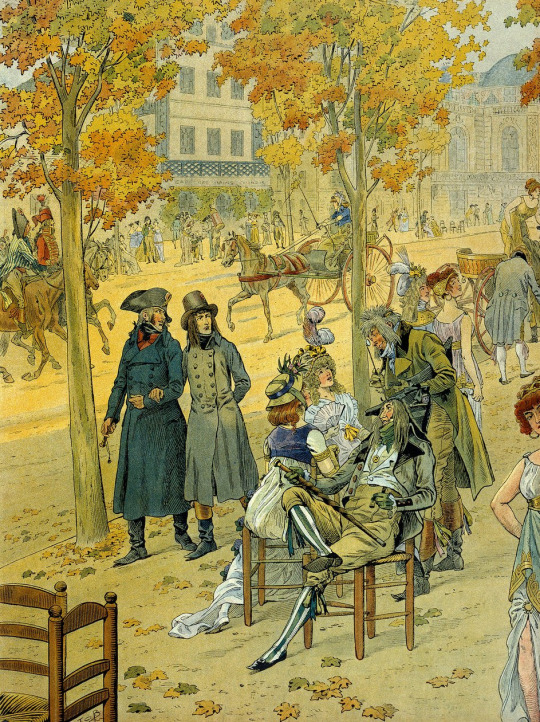
^ this illustration by Jacques Onfoy de Bréville represents one of their "leisure moments" together circa 1794-95
so after a little while Napoleon got married and found his fortune, Junot continued to follow him to his legendary Italian and Egyptian campaigns. In Egypt, he was promoted to General but he was actually not too happy with this since this means he'll be away from Napoleon often. There's also this famous (or infamous?) incident where he challenged General Lanusse to a duel ,simply because he opposed Napoleon's leadership , with this words :
«We must fight; it is essential that only one of us survive. I hate you because you hate the man that I love and admire as much as God, if not more»
sounds like a chivalric romance doesn't it? :3 It was also during this campaign there were rumours within the army comparing Naps and Junot to "Hadrian and Antinous" . of course Junot does nothing to dispel those rumours 🤓 Poor guy got wounded in the stomach and Naps didn't visit him until the last minute.
Napoleon wasn't able to take Junot with him when he left Egypt and by the time Junot made it back to France in 1800, Napoleon was already First Consul and the power differences between them already put a strain on their relationship. This was further exacerbated once Naps became Emperor.
When Naps sent Junot to Portugal , he wrote a bunch of desperate letters begging him to reappoint him as his aide-de-camp again and Napoleon once confronted to Junot's wife about the letters he wrote to him (I'm like 99% sure it probably sounded more romantic than the ones he wrote to her) . it got to the point that Laure Junot ahd to admit that Junot possibly loved Napoleon more than her and their children.
Junot was often sent away from Napoleon during from like c. 1806-1810ish? and didn't interact much except by correspondence (I think) I'm going to skip over the Portugal /Spain period
Okay so by the Russian Campaign of 1812, Junot pretty much fell out of favour from Naps and the consequences of Junot's actions almost completely destroyed their relationship. By this time period, Junot's mental and physical health was very, very fragile from his campaigns in Portugal & Spain and Napoleon was no longer the Napoleon he knew back in their youth. Napoleon was furious and even shamed him on the military bulletin. Junot was devastated at this and the thought of losing Napoleon's friendship was unbearable after 20 years of being devoted to him.
After he returned to France from Russia, there are several anecdotes mentioning how he would wanderlessly mutter out loud that “The Emperor no longer loves me” in his apartments😭 Napoleon's love for him was all that mattered😭😭💔
There's this scene where Duroc (Napoleon's Grand Marshal of the Palace) and another friend visited Junot to comfort him and this happened:
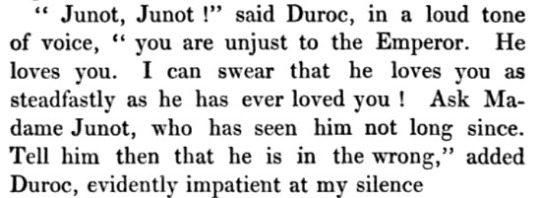
Junot obviously didn't believe the Emperor still loved him of course💔

Soon after spending some time resting and with his family, he was appointed Governor of Illyria. (I think Naps sent him there because he wanted him out of France but Idk). His insanity finally set in and there's this infamous incident where Junot attended the ball completely naked except for his medals and hat and his battle wounds were on full display...
Soon after that, he had to be forcefully be sent back to his father's home in Montbard. It was there where he committed suicide by jumping out the window.
💔
Junot's last letter to Napoleon is heartbreaking by the way....
“I who love you with the affection of a savage for the sun, I who am entirely yours. Well then: This eternal war that we must fight for you, I WANT NO MORE OF IT! I WANT PEACE! I want finally to repose my tired head, my sore limbs … to enjoy that which I earned … with my BLOOD! The blood of an honest man, of a good Frenchman, of a true patriot. I therefore ask, at last, for that tranquility that I earned through twenty-two years of effective service and seventeen wounds from which my blood has flowed for my country, and for your glory.
Like I mentioned in the beginning, soon after the news of Junot's demise reached the public, Napoleon immediately sent someone to his house in Paris where his wife and brother-in-law were at and forcibly searched through Junot’s home to seize and burn his letters.
Oh yeah there's more but I'll leave it at that for now </3 LIKE WHAT THE HELL NAPS WHY DID YOU BURN THE LETTERS 😭😭Like they must've been fucking crazy man,,, omg sorry this keeps me up at night 😭
they make me so

Junot's ending was sooo tragic.... he was definitely a Greek tragedy-esque figure😢 He possibly died believing Napoleon hated him when that wasn't the case. Napoleon, despite reprimanding Junot very harshly for Junot's actions (non-actions?) during the Russian campaign, he still had a soft spot for him.
I also think of like how his life would've been better without meeting Napoleon. But also thinking again how much Junot treasured his meeting with Napoleon.... ough they're so painful sdkjskdljdhljhdjfhdkjhfdj excuse me while I combust
NapJuno was basically like painful unrequited love slow burn over 2 decades . Or maybe it wasn't completely unrequited? I like to think Napoleon was in denial and constantly tried to suppress his feelings for Junot 😔😔😔 anyway Junot was so delulu... (he's my precious delulu cat) he kept hoping Napoleon would still love him like he used too pre-Emperor days. Of course those days will never come back. I guess he was always living in the past while Naps moved on 🥲💔
well even if Napoleon doesn't love him at least I do 😤
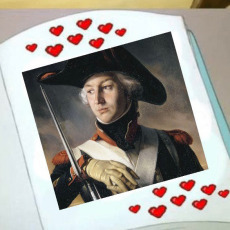
as my friend @ promises-of-paradise once said, I think Junot was almost definitely romantically obsessed with Napoleon. Like actual romantic love (I'm not even being delusional this is what I truly believe). Whether they actually did anything together is up for debate, but it’s clear that Junot’s feelings for Naps were a lot more intense than a regular friendship.
also I highly recommend reading these posts regarding Junot and NapJuno's relationship:
The NapJuno bible of course: https://erenow.org/modern/napoleonic-friendship-military-fraternity-intimacy-and-sexuality/4.php
BTW THERE'S A NAPJUNO RPF WRITTEN AND PUBLISHED IN A FRENCH MAGAZINE BACK IN 1926!!!! I JUST NEED TO FIND THE LINK (it's also in French)
and Laure Junot's memoirs! it's available on the internet and she (and imo rightfully) suggests Napoleon and Junot were possibly incredibly intimate during their broke days. Girl was the OG napjuno shipper istg
~~
If any of my fellow NapJuno fanatics want to add info about them more please do so!!! I'm probably forgetting some stuff 😭
54 notes
·
View notes
Text
what i love about my napoleon podcast is that i didn't actually know a lot going in, but all i knew came from british propaganda or from napoleon himself's propaganda, and the truth is so much more interesting and also so insane. the twists, the character arcs, the foreshadowing, the lucky breaks, the destinies that keep meeting, it's almost hard to believe at times. i think if i could make a movie about napoleon, i'd focus on his attempts at radical jacobin politics in corsica, his family's exile and end on the siege of toulon in 1793. what happens next? oh, you know...
24 notes
·
View notes